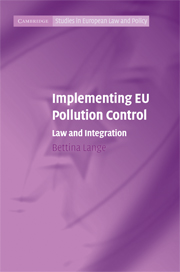Book contents
- Frontmatter
- Contents
- Series editors’ preface
- Acknowledgements
- Update on the IPPC Directive
- Abbreviations
- 1 Introduction
- 2 Traditional perspectives on the role of law in EU integration
- 3 Critical perspectives on the role of law in EU integration
- 4 What is EU ‘law in action’?
- 5 Talking interests – generating procedure: How political discourse constructs key aspects of BAT determinations in BREFs
- 6 Variation in open and closed BAT norms
- 7 What does it cost? Economic discourse in the determination of ‘the best available techniques’ under the IPPC directive
- 8 Does ‘law’ integrate? Licensing German and English coke ovens under the IPPC Directive
- 9 Conclusion
- Appendix: Methodology
- Bibliography
- Index
9 - Conclusion
Published online by Cambridge University Press: 07 August 2009
- Frontmatter
- Contents
- Series editors’ preface
- Acknowledgements
- Update on the IPPC Directive
- Abbreviations
- 1 Introduction
- 2 Traditional perspectives on the role of law in EU integration
- 3 Critical perspectives on the role of law in EU integration
- 4 What is EU ‘law in action’?
- 5 Talking interests – generating procedure: How political discourse constructs key aspects of BAT determinations in BREFs
- 6 Variation in open and closed BAT norms
- 7 What does it cost? Economic discourse in the determination of ‘the best available techniques’ under the IPPC directive
- 8 Does ‘law’ integrate? Licensing German and English coke ovens under the IPPC Directive
- 9 Conclusion
- Appendix: Methodology
- Bibliography
- Index
Summary
Introduction
This book has discussed law and EU integration relationships. What conceptualisation of law are we presupposing when we say that ‘law’ integrates? Is there really a distinct ‘legal’ dimension to EU integration? The book argues that ‘the role of law in EU integration’ is an empirical question. An integrating function of law should not simply be assumed on the basis of theoretical assumptions. The book therefore discusses small-scale qualitative empirical data on how determinations of ‘the best available techniques’ are achieved in the implementation of the EU Directive on Integrated Pollution Prevention and Control. Implementation of the Directive has been analysed at the EU, the national and the local level by reference to the licensing practices in a German and UK regulatory authority.
The book's argument proceeds in three stages. Firstly, chapters 2 and 3 discuss literature on the role of law in EU integration and examine traditional and critical perspectives. Chapter 2 argues that traditional accounts rely on notions of law which are generated internally by formal legal systems themselves. In these accounts law is portrayed as instrumental, as relatively autonomous in relation to its contexts, and as codified in formal legal texts. Chapter 3 discusses contributions – which also rely on social constructivism – that reject these assumptions, including the literature on new modes of EU governance. Chapter 4, however, argues that there is scope for further development of socio-legal analysis of EU law in action.
Information
- Type
- Chapter
- Information
- Implementing EU Pollution ControlLaw and Integration, pp. 264 - 291Publisher: Cambridge University PressPrint publication year: 2008
